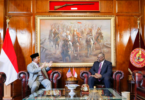Mesut Zeyrek
COLOGNE: At least three mosques came under attack in Germany on Sunday.
In the first incident, a mosque in the central Kassel city was attacked with Molotov cocktails early morning.
The attack caused no casualties but minor damage was caused to the mosque managed by the European Turk Union (ATB), one of the largest Muslim-Turkish associations in the country.
Security footage showed four assailants being involved in the incident during which some windows of the Yunus Emre mosque were also broken, frames partially burnt and walls of the building damaged.
The incident took place at around 4.30 a.m. local time (0230GMT).
Mustafa Koc, head of the cultural center that runs the mosque, said: “We want police to catch everyone responsible for the attack.
“The continuation of such attacks increases our worries. We expect authorities to move and act urgently solve these problems. We call on the whole Turkish community to remain prudent.”
Separately on Sunday, two more mosques were vandalized in Herne city and Amberg town; both houses of worship were being managed by the Turkish-Islamic Union for Religious Affairs (DITIB).
At the Wanne Eickel Haci Bayram Mosque, the assai-lants drew a cross on the front door and wrote messages praising the Nazi leader, Adolf Hitler; political messages supporting the YPG/P-KK terrorist group were spr-ay painted on the Ulu Mo-sque. At least 40 such attacks have been recorded since the beginning of this year in Germany.
The PYD/PKK group and far-left organizations claimed responsibility for more than two dozens of attacks since launch of the Turkish military-led Operation Olive Branch in Syria’s northwestern region of Afrin against YPG/PKK-Daesh terrorists.
The attacks targeted Turkish mosques, associations and shops in various cities, including Berlin, Frankfurt, Hamburg, and Aachen.
German police have failed to arrest assailants in most of the incidents.
The PKK has been banned in Germany since 1993, but it remains active, with nearly 14,000 followers in the country.
Ankara has long criticized Berlin for not taking serious measures against the PKK, which uses the country as a platform for their fund-raising, recruitment, and propaganda activities.
Germany has a 3 million-strong Turkish community, many of whom are second- and third-generation German-born citizens whose Turkish grandparents moved to the country during the 1960s. (AA)






